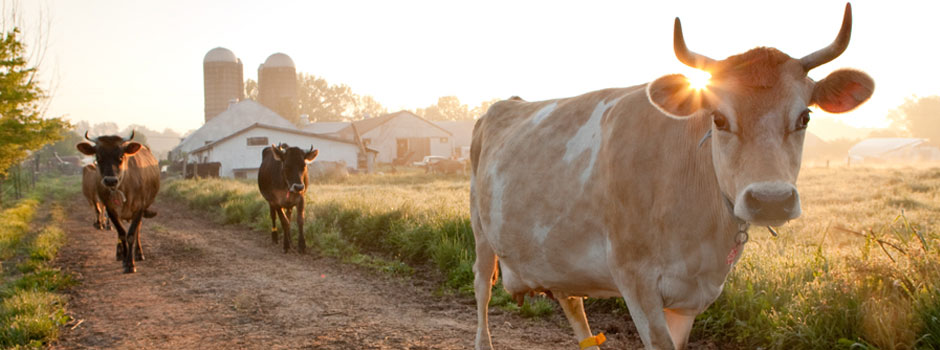Cow manure that has fermented in the soil over the winter while stored in a cow horn is mixed with water and stirred vigorously for one hour, regularly changing directions. This mixture is then applied to the soil in minuscule amounts before sowing to encourage healthy root growth.
Sounds like a magic potion? This is one of eight preparations that Demeter-certified farmers apply to their fields and compost heaps. Preparations are made from animal manure, minerals, and herbs, and are applied in homeopathic quantities to the soil, foliage, and compost. The type of farming that requires the use of these medicinal, plant-based preparations is referred to as biodynamic and preparations are used to encourage the microbial life needed for soil fertility. Biodynamic agriculture goes beyond organic standards and views the farm holistically as part of an integrated agricultural ecosystem. This holistic, and almost spiritual approach, was born from an agricultural lecture series by Rudolf Steiner, an Austrian philosopher and social reformer in 1924.

AN ASSOCIATIVE ECONOMY
Based on Steiner’s anthroposophic ideas, many biodynamic farms are also approaching economic relationships with an emphasis on cooperation and transparency. They value harmony and social responsibility in their operations and aim to form cooperative relationships with actors along the agricultural supply chain; from seed producers and farm workers, to mills, wholesale distributors, and all the way to the consumer. An example for this cooperative approach is Community Supported Agriculture (often abbreviated as CSA). This relatively widespread movement originated from biodynamic farms and allows farmers and consumers to support each other. Typically, a farm sells their products to a processor, who passes them on a distributor, who finally sells them to a retail store, where the consumer can buy them. In the CSA approach, consumers form a direct relationship with the farmer, purchasing farm shares at the beginning of the year and receiving seasonal produce throughout the harvest cycle. Innovative concepts to incorporate associative relationships exist in other areas of the economy as well. For example, some banks provide credits to farmers in an effort to make land access more equitable. Taking inspiration from Steiner’s insights into social and economic transformations, biodynamic farming aims to advance a shift from solely monetary transactions of agricultural commodities to a holistic food system based on relationships.

DEMETER IN THE U.S.
In the United States, all biodynamic farms are certified by the Demeter association. Among other requirements, biodynamic farms have to apply the eight preparations described above, set aside 10% of their total farm acreage for biodiversity, grow 50% of their own livestock feed, and stock animals at a rate that their manure provides adequate fertility for their crops. The Demeter certification is already used by more than 5,000 farms in 54 countries. While in 2017 in the U.S. there were only 300 certified biodynamic farms, compared to 21,781 certified organic operations, the number of biodynamic-certified farms is likely to increase in the coming years. Consumers are driving the demand for Demeter products despite challenges such as potentially lower yields and a lack of scientific data supporting some of the unconventional farming practices used by Demeter farmers.
Biodynamic critics say that advocates for biodynamic farming are mixing objective facts about soil health and ecology with subjective beliefs about the homeopathic methods associated with Demeter. However, consumers don’t necessarily care about the scientific evidence, they often tend to make emotion-based choices. Whether one chooses to believe in the effectiveness of the more unconventional and homeopathic aspects of biodynamics or not, the holistic approach of valuing animal welfare, healthy soils and ecosystems, as well as the wellbeing of farmers themselves, convinces many consumers that biodynamic farming is the right way. The principles of associative economics might serve as a blueprint for a more equitable sharing of risks and rewards along the agricultural supply chain, which is currently neglected in our current industrial food production.
Viola Taubmann, Research Assistant|Viola Taubmann is a Master of Environmental Management candidate at the Yale School of the Environment, focusing on sustainable agriculture and agroforestry. She is particularly interested in conservation on agricultural land and international development. Viola previously worked on ecosystem-based adaptation to climate change at the German Agency for International Cooperation (GIZ) and on agricultural policy in the European Union. She holds a B.Sc. in Earth and Environmental Sciences from the University College Freiburg in Germany and was a visiting student at the University of California, Los Angeles. See what Viola has been up to. | Blog

